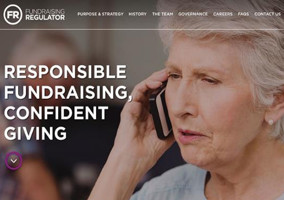Stephen Dunmore, chief executive of the Fundraising Regulator, argues that his organisation's decision on the FPS last week is the best solution for both the public and for the sector.
Writing for this title last week, Hugh Radojev concluded that the Fundraising Preference Service (FPS) is a service for “the public first, the regulator second and the sector a very distant third”. I agree with one part of this: the public comes first.
For too long, too many people not had a choice over the frequency of their contact from charities. FPS will help tackle this, giving the public greater control of the communications they receive via phone, addressed mail, e-mail and text, and play an important role in helping to rebuild trust.
Gaining this control will be straightforward. A person who wants to opt out of communication with a charity will be able to register online or by phone, after which the Regulator will inform the affected charity. If the person does not know the name of who they want to opt out from, the Regulator will work with them to identify the charity or charities in question.
Simplicity is essential to the design of FPS. The solution has to be one that is effective and straightforward, because it needs to give the public confidence rather than cause confusion.
Better for charities
However our focus on the public does not mean that the sector has been ignored. Charities are not in direct competition with donors, so it is wrong to think what is good for individuals is bad for the sector. In no way has FPS placed the sector a “very distant third”.
As part of our process, we reviewed 131 responses to the Fundraising Preference Service Working Group Report and these played an important role in shaping FPS.
Many of the responses came from charities and they helped to create a solution that is simple, balanced and considers the fundraising needs of charities, as evidenced by the support of the NCVO, the Institute of Fundraising and many other charities commenting since our announcement on 1 December.
FPS will save charities time, effort and money when compared to other proposals that were discussed. We decided not to proceed with the “28 day” proposal, which would have seen charities check donor consent within 28 days of an opt-out, because it would be far more expensive and onerous for charities. FPS is being designed so that the Regulator manages the process, meaning that costs are kept as low as possible for the sector. It is unfair and untrue to assert that the proposal will be expensive for charities.
Clear communication
There have also been questions about our definition of fundraising communication. Quite simply, we have followed the ICO’s definition of what constitutes direct marketing material. This is the clearest way of defining fundraising communication, rather than getting into knots about technicalities. It is also in-sync with the way the public views communications – for instance, an ‘advocacy’ email from a charity, even one that does not have a donation option, could still viewed by a recipient as an indirect call for funds.
Some of this debate has also been slightly contrived. Committed donors are highly unlikely to want to opt out from the charities they support, particularly where charities have sought and renewed their consent for contact. We recognise that there may be a need for a charity to communicate for other administrative or service reasons, for example to clarify a direct debit arrangement or to deal with a change of address and will work through the detail with the preferred supplier of the system once they are appointed.
We will also provide wrap-around guidance to explain what FPS will do and as importantly, what it will not do when we are ready to launch it.
As has also been noted, there are similarities between FPS and the Telephone Preference Service (TPS). As outlined by the ICO, FPS will run alongside TPS and opt outs will have the statutory force of a Data Protection Section 11 notice to cease direct marketing.
A joint responsibility
The creation of FPS does not exist in isolation and we have not decided to foist regulation on the sector for the sake of it. There has been a clear need to give the public more control over their contact with charities, which is why we have designed a system that puts the public first.
FPS has not been designed to make the Regulator’s life easy, but instead to reduce the burden felt by individuals who have been overwhelmed by charity contact.
Clearly it would be impossible to make everyone happy, however we will now have a balanced approach that will go some way to rebuilding public trust in the sector.
Lastly, it is important that the sector understands the wider role of the Fundraising Regulator and the need for independence in the way it works with charities and the public alike. In his blog, Hugh writes that our recent Neet Feet decision didn’t “exactly exceed expectations”, implying that we should make a decision with half an eye on pleasing an audience.
Unfounded comments like this are unhelpful and unnecessary. We are a Regulator and not a kangaroo court and our decisions are the result of evidenced based adjudications. We do not seek to meet the “expectations” of any party in adjudicating on a complaint, but to treat all parties fairly.
If the sector is going to improve its reputation and restore the public’s faith, it needs to continue improving its communications with the public. In an ideal world, FPS would not have been necessary – yet it is. The situation has to change and it has to improve, we all have a responsibility to ensure this happens.
Related Articles












